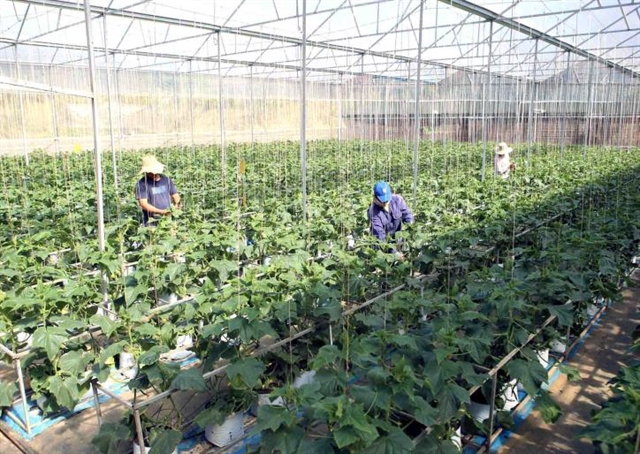 Economy
Economy

 |
| Farmers and cooperatives aiming for effective business operations on e-commerce platforms must take a proactive role in managing their online stores. VNA/VNS Photo |
HCM CITY — In line with emerging trends in modern shopping, numerous co-operatives have proactively adopted digital transformation strategies.
These include listing products on e-commerce platforms and engaging in live-streaming sales, all with the goal of swiftly delivering cooperative goods to consumers.
However, there are still many challenges hindering the process of turning e-commerce into a playground for co-operatives to reach customers and find outlets for their products.
Nguyễn Thị Bích Thảo, director of the Quảng Nam Cordyceps Co-operative, shared that as a business producing cordyceps products with three-star OCOP (One Commune, One Product) certification, the co-operative approached various e-commerce platforms for selling.
However, doing business on e-commerce platforms was not easy because the product control process was unclear, leading to consumer confusion between authentic and fake products.
The difference between direct and online sales also created significant pressure on cooperatives due to employees not being thoroughly trained in computer skills.
Logistics infrastructure and shipping costs, accounting for a significant proportion of the final cost, also created considerable pressure for getting agricultural products onto e-commerce platforms.
Meanwhile, Nghiêm Xuân Dưng, director of the Organic Agriculture and Service Cooperative Hoà Phát in Đắk Nông, shared that despite durian being a strength of the cooperative, it faced numerous challenges when introduced to e-commerce platforms due to the perishable nature of the product, necessitating immediate sales.
Due to limited capital, the co-operative had been unable to invest in freezing and processing technology, as well as establish connections with related businesses.
As a result, online sales served primarily as a display and a promotional channel for products, providing customers with information about the products and facilitating price comparisons, he said.
Another reason why co-operatives continue to adhere to traditional sales methods is their uncertainty about the initial steps, such as photography, live-streaming sales or customer interaction.
Experts indicate that significant bottlenecks for co-operatives lie in their reliance on e-commerce platforms, particularly in terms of technology. When these platforms run large discount promotions, a surge in website traffic can lead to network crashes.
Representatives of some cooperatives have said that competition is fierce when putting products on e-commerce platforms.
Modern-day co-operatives
To become preferred suppliers for businesses, co-operatives must carefully manage and ensure numerous factors such as production processes, packaging, design, quality, and costs, experts have said.
It is essential to highlight that even a slight difference in product prices during negotiations with e-commerce platforms and customers could mean missed opportunities for the cooperative.
Currently, numerous co-operatives have shifted their focus to selling on TikTok due to its extensive pool of content creators who can effectively help promote and sell products.
A survey conducted by the World Bank indicates that up to 60 per cent of farmers and cooperatives are open to investing in consultancy services and forecasting information. This showcases a proactive attitude towards learning and improving digital transformation skills, which are readily accessible within co-operatives.
In the National Digital Transformation programme, the Government aims for every farmer to become a merchant and each cooperative to evolve into a technology-driven enterprise.
As such, it is imperative to provide training and support for farmers and cooperatives to become true e-commerce sellers, moving beyond simply listing products on platforms as they currently do.
According to a representative of the Trade Promotion and Investment Centre under the Việt Nam Co-operative Alliance, modern-day co-operatives have concentrated on production, striving to deliver quality products. However, there has been a lack of genuine investment in human resources for the advancement of e-commerce.
Cooperatives and farmers, especially older generations, need a new mindset to fully utilise the benefits of e-commerce, the representative said, adding that selecting e-commerce platforms to sell on needs to be carefully considered and calculated.
Crucially, farmers and cooperatives aiming for effective business operations on e-commerce platforms must take a proactive role in managing their online stores.
To enhance engagement on these platforms, training farmers and cooperative members on effective customer outreach strategies will bring agricultural products closer to consumers.
Recently, the Ministry of Industry and Trade has implemented a series of E-commerce Connection programmes combined with training and e-commerce workshops in some provinces and cities.
These programmes aim to promote regional connections and foster linkages that enable the consumption of local agricultural products and specialties through e-commerce.
The Ministry has established sanviet.vn, a consolidated e-commerce platform for 63 provinces and cities.
This platform connects and offers support to sellers, buyers and digital platforms by facilitating the supply of goods, connecting services and creating an environment for the development of a competitive, transparent e-commerce market.
This systematic approach builds an online retail database centralised from the national to local levels, enabling end consumers to access and purchase quality products at reasonable prices. VNS




